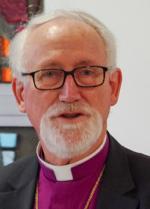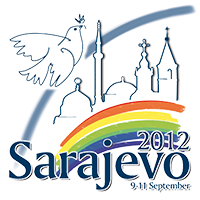
Lutheran Bishop, Germany
|
Some day during the early months of my studies of theology I heard someone explain that people who went to heaven would sit at the side of God and sing “Alleluia” all day long. “Oh, no”, I groaned inwardly. At that moment, heaven, however important it remained in my young mind, lost some of its immediacy, if not some of its luster. Then I continued my studies and realized the importance of what it really might mean to be able to sing alleluia all day long, every day of your life. The very thought of It spun my world in an audacious new direction. What if life itself was meant to be one really long alleluia moment? Here, indeed, resided the real meaning, the real hope, of life. But is it possible? God is a mystery in which we live every moment of every day. The only question is, how? What kind of God is this God we seek?
Is God a giant who must be pacified as we got through life? Is life an obstacle course designed to merit only the perfect, only the docile? Or is the human condition a bundle of gifts wrapped in darkness, the life task of which is to learn to recognize Goodness/ Godness in all its misty forms? One thing I am sure about: The presence of God in life requires conscious contemplation. All the richness, all the manifestations of God in life cannot be reduced to catechism answers. And yet, at the same time, in the God who is not amenable to simplification are all the answers a person needs to live a life full of confidence in what is seen, and also to take as a given the gifting of the unseen as well. That means: Life itself is an exercise in learning to sing alleluia here in order to recognize the face of God hidden in the recesses of time. To deal with the meaning of alleluia in life means to deal with moments that do not feel like alleluia moments at all. But how is it possible to say alleluia to the parts of life that weigh us down, that drain our spirits dry, that seem to deserve anything but praise?
The question is a worthy one. Life, after all, is a struggle, a journey in uncharted space, an exercise in both, gain and loss, joy and sorrow. No life consists of nothing but success and satisfaction, security and self-gratification. Failure and disappointment, loss and pain are natural parts of the human equation. Then what? What use is an alleluia then, except perhaps to encourage some kind of emotionally unhealthy self – deception? No, alleluia is not a substitute for reality. It is simply the awareness of another whole kind of reality – beyond the immediate, beyond the delusional, beyond the instant perception of things.
One of the oldest anthems of the church, alleluia means simply “All hail to the One who is”. It is the arch-hymn of praise, the ultimate expression of thanksgiving, the pinnacle of triumph, the acme of human joy. It says that God is Good – and we know it. In the Hebrew scriptures the word is an injunction to praise, a call to the people to summon up praise in themselves. It is a challenge to see in life more than is seeable in any single moment and to trust it. In the Christian scriptures it is a formula of praise. Most of all, it is an intensely emotional response that, in early liturgical use, was said the entire year, as it still is in the Eastern Church, even in liturgies for the dead. In the most ancient part of the Christian tradition, then, it calls us to see all of life as life-giving, somehow, in some way, whether its present gifting is apparent or not.
Every segment of life is both gift and challenge, both endowment and responsibility. When you get this view of life you will understand why you cannot search for God without searching for man.
A couple of years ago Bishop Vincenzo Paglia wrote a small book: “Bible repairs our heart. God and man in search of one another”. The first chapter is titled “Beginning with the Word of God”. It reminds us of the two disciples of Emmaus. “Did not our heart burn within us while He talked with us on the road and while He opened the Scripture to us?” (Luke 24,32) they said to one another at the end of that day begun in such immense sorrow. They had lost their master, and in the most tragic and ignominious way. His opponents had succeeded in having him condemned to death. He died on the cross. It all seemed finished forever and even the hope for a new life He had inspired in them and so many others had been shattered. There was nothing left to do but go home and take up their previous lives – hardly an inspiring return. The further they got from Jerusalem, the more their hearts suffered the gloom of resignation. While they were thinking these things, writes Luke, a stranger approached and joined up with them. As they walked along listening to him, their thoughts began to quieten and their hearts to warm. At the end of their journey they felt exceedingly happy. Hope had been rekindled in their hearts. They felt instinctively attached to this stranger and wished he would stay with them. They begged him to stay for dinner, as it was already growing dark. – He accepted the invitation and went in to dine with them. The Evangelist writes that, when “He broke bread”, their eyes were opened and they realized that this stranger was Jesus. Only He knew how to break bread in that way. Perhaps they tried to embrace him, to make him stay, but He vanished. They no longer saw Jesus with their eyes, but the hope that had been rekindled in their hearts as they walked on the road began to burn brightly. – They could not stay closed up in the house. That powerful fire burning inside them spurred them on to return to Jerusalem immediately. How could they keep what had happened to themselves? They had to tell the other disciples how they had recognized Jesus by the way He broke the bread. Jesus had risen!
We too, like the two from Emmaus, need to welcome that stranger among us. And often the stranger to us is precisely the word of God. It is the word of God which helps us to understand the Gospel in the way that we understand how God is searching us. The two Emmaus disciples thought they had lost Jesus. And then they recognize: He has been with us all the time. They recognize Him by the way He is breaking the bread. The Word of God AND the Eucharist – not either … or; no: AND. Bishop Vincenzo writes: “Without a community in which to be read, the Holy Scripture becomes a dry, lifeless text.” The two are inseparably connected.
“In search of God to find man.” The Bible tells the story of God, who, for His great love, comes down to earth in search of man. It tells too of man’ s search for God. In the Bible, in fact, God and man seek each other out; they meet and speak together. The Bible teaches us to know the heart of God, the Creator who cannot do without man. But it also teaches us our own hearts, as we become aware of our place within a much greater history: that of the Lord with His people. We can all find ourselves in the pages of the Scriptures. It is said in the ancient rabbinical tradition: “Read and re-read the Thora, because all things are found therein and you too are in it fully and completely. “
A German author of the 20th century – Ricarda Huch – expressed it this way”: The Bible tells us many old stories which will happen again – day for day.
Thank you.
|

